After months of negotiations and a stalled vote, the wait is finally over: President Joe Biden has signed the $1.2 trillion infrastructure bill — one of the key legislative goals of his economic plan — into law on Monday, marking the largest historic investment in U.S. infrastructure.
The law, formally known as the Infrastructure Investment and Jobs Act, will set into motion the flow of billions of dollars to states and localities to improve bridges and roads, install electric vehicle charging stations, expand railways, replace lead pipes, expand broadband and other public works projects.
Biden signed the bill into law Monday in a White House ceremony that featured both Democratic and Republican lawmakers, mayors, governors, labor union and business leaders. Biden was joined by the bipartisan lawmakers who helped craft the final infrastructure deal, negotiations that concluded in June.
The bill will inject funding into projects, states and localities over the next ten years, and leaders on Monday said it would impact every American and community across the country.
Speakers at Monday's signing ceremony included Vice President Kamala Harris, lead Senate negotiators Sens. Rob Portman, R-Ohio, and Kyrsten Sinema, D-Ariz., Congressional leaders House Speaker Nancy Pelosi, D-Calif., and Majority Leader Chuck Schumer, D-N.Y., and the president himself.
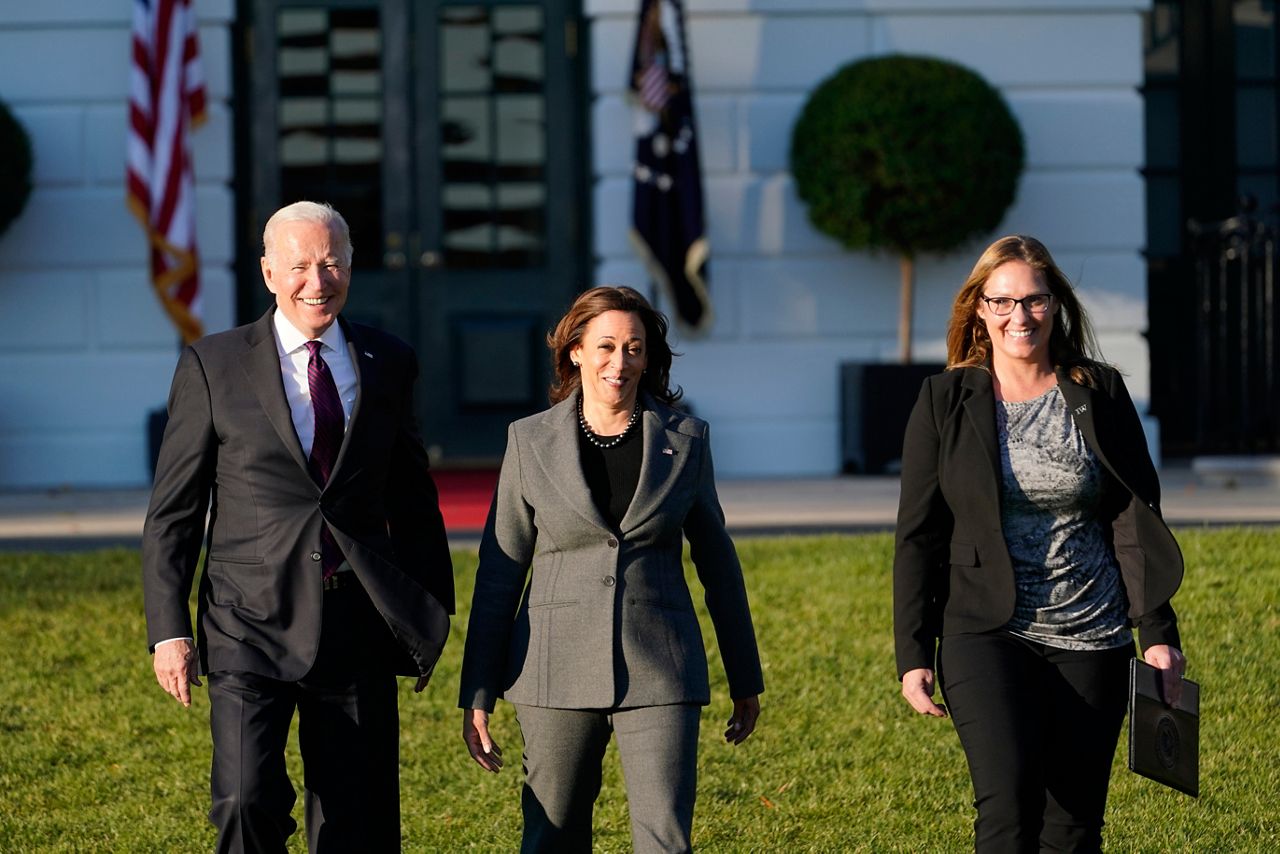
"I know folks are tired of the bickering in Washington," Biden said. "Frustrated by the negativity."
"The world has changed and we have to be ready. My fellow Americans, today I want you to know we hear you and we see you," Biden added. "The bill I'm about to sign into law is proof that despite the cynics, Democrats and Republicans can come together and deliver results."
President Biden also signed the bill into law just hours before he was set to meet with Chinese President Xi Jinping in a virtual bilateral meeting, as the U.S. seeks to compete with China on the world stage. The infrastructure law is the first time the U.S. will be investing more in public works than China, the White House noted.
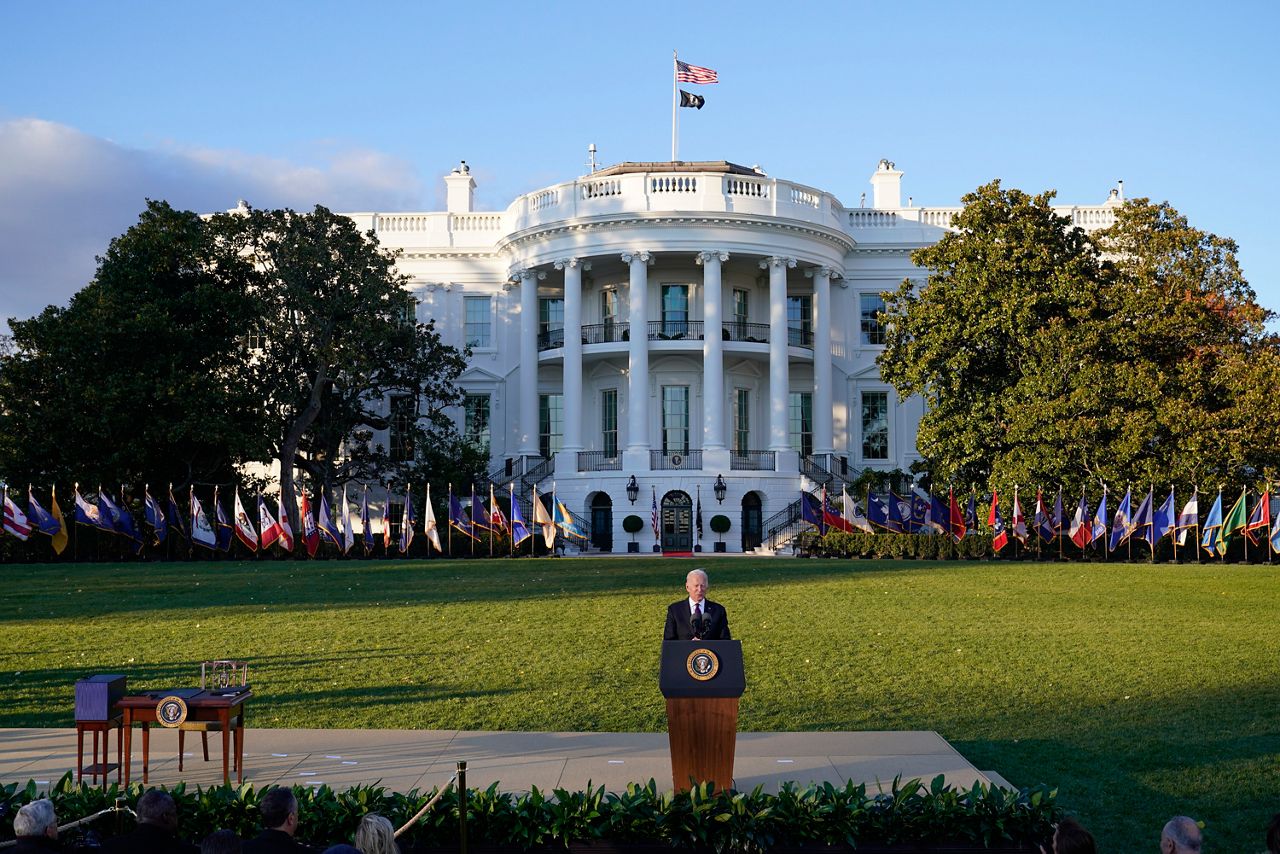
Biden thanked the lawmakers in attendance who passed the bill, Democrats and Republicans, giving a special shoutout to Republican Leader Mitch McConnell, R-Ky.
"I also want to thank Minority Leader Mitch McConnel for voting for this bill," as well as for talking about how "useful and important" the bill is.
Biden called Sen. Sinema, one of the key moderate holdouts on his economic agenda, the “most determined person I know.”
“Senator Rob Portman is a really a hell of a good guy," Biden said of Ohio's Republican representative in the U.S. Senate.
"I'm not hurting you, Rob, because I know you’re not running again," the president joked. "That’s the only reason I’m saying it. But you are a helluva good guy.”
"For too long, we’ve talked about having the best economy in the world," Biden said in his remarks. "We’ve talked about asserting American leadership in the world with the best and safest roads, railways, ports, and airports. Here in Washington, we’ve heard countless speeches, promises, and white papers from the experts."
"But today, we are finally getting it done," Biden added. "My message to America is this: America is moving again, and your life is going to change for the better."
"Too often in Washington – the reason we don’t get things done is because we insist on getting everything we want," Biden continued. "With this law, we focused on getting things done."
"I ran for president because the only way to move our country forward is through compromise and consensus," Biden said. "That’s how our system works. That’s American democracy. And I am signing a law that is truly consequential, because we made our democracy deliver for the people."
"Throughout our history, we’ve emerged through crises by investing in ourselves," President Biden said as he ended his speech. "It’s never ever been a good bet to bet against the American people."
“Throughout our history, we’ve emerged through crises by investing in ourselves,” President Biden says, closing his speech on the infrastructure bill. “It’s never ever been a good bet to bet against the American people.”
The lawmakers who were crucial in negotiating the bill – Sens. Portman and Sinema – spoke first on Monday.
"How many times have we heard that bipartisanship isn’t possible any more or that important policy can only happen on a party line vote?" Sinema said. "Our legislation proves the opposite."
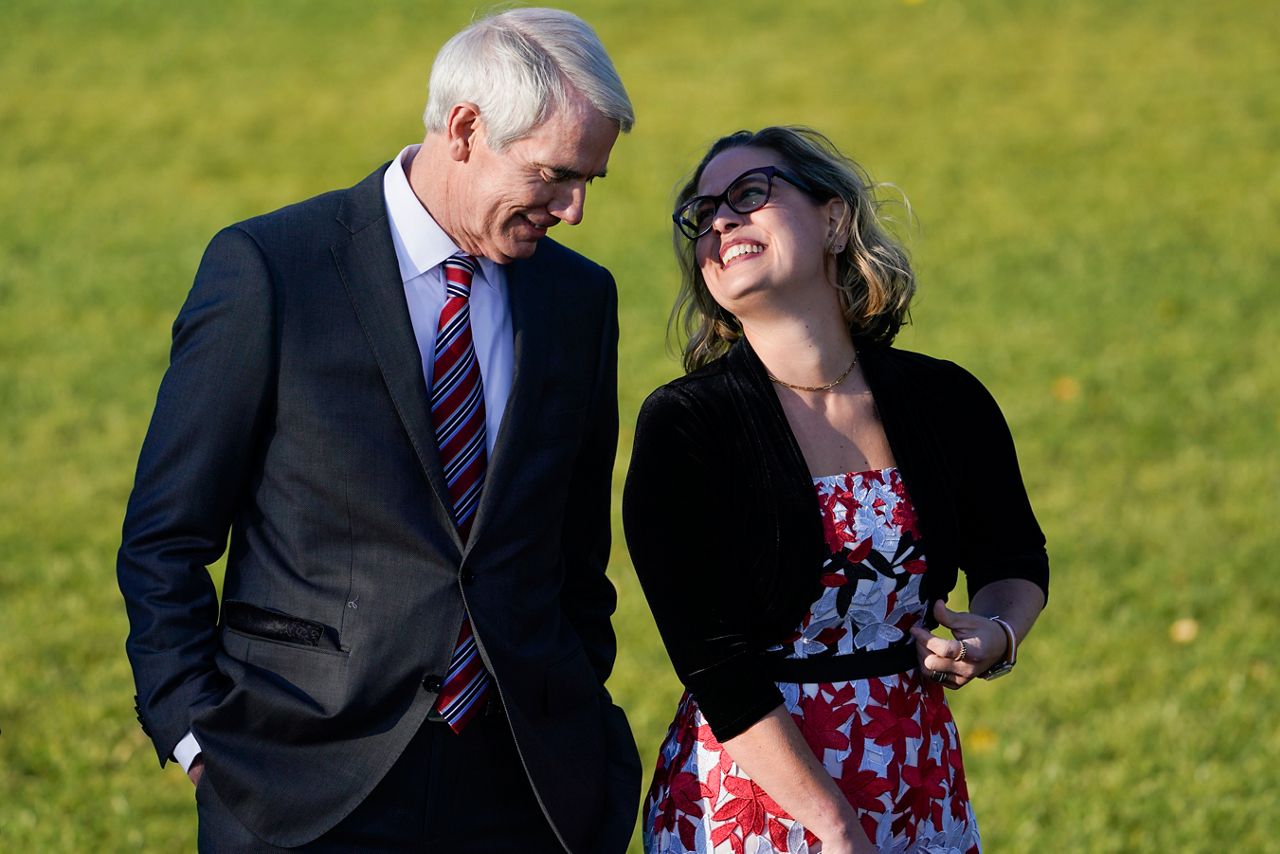
"This is what can happen when Republicans and Democrats say we’re going to work together to get something done," Portman, who is not running for re-election next year, said at the ceremony. "Finding common ground to advance the interests of the American people should be rewarded, not attacked."
Portman gave some credit to Biden's predecessor, former President Donald Trump, for furthering discussion on infrastructure. Despite infrastructure being a key priority of his administration, Trump could not reach an infrastructure deal with members of Congress in his single term in the White House.
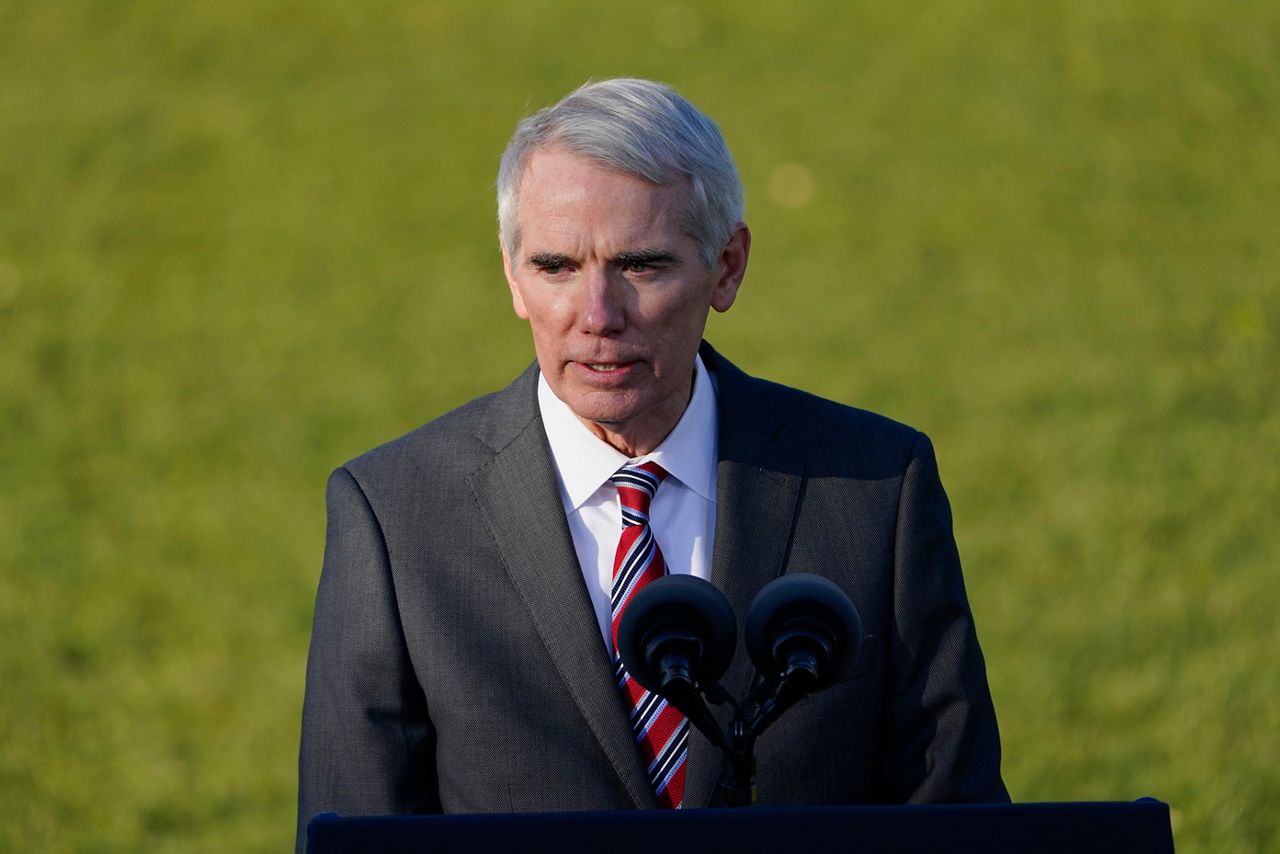
Paraphrasing Biden's own remarks to then-President Barack Obama after passing the Affordable Care Act, Majority Leader Schumer called the infrastructure bill "a big effing deal."
“This bill can be summed up by a four letter word: J-O-B-S," Schumer continued. The Majority Leader pledged to pass Biden's Build Back Better bill, the companion legislation to the infrastructure bill which devotes spending to social programs and combatting climate change, soon, to thunderous applause from the crowd.
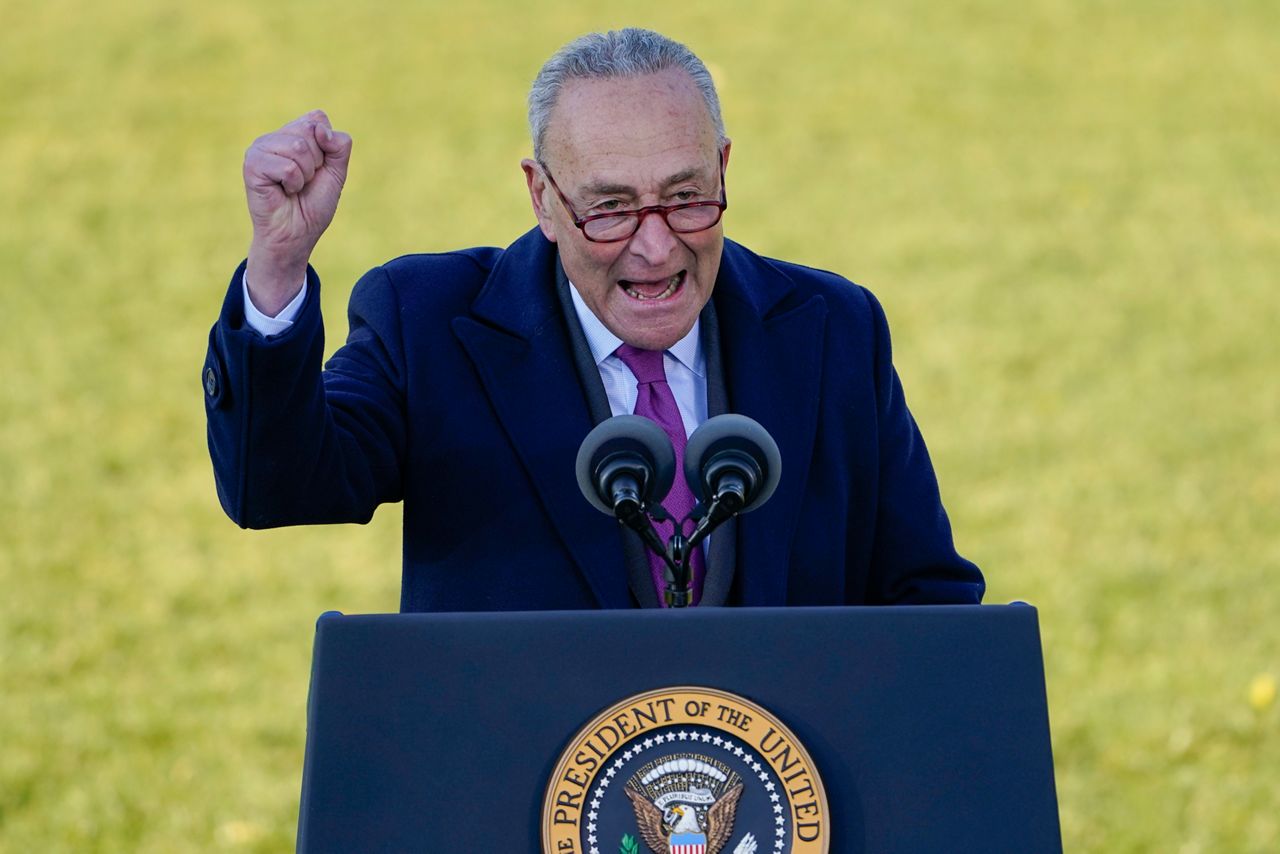
"We got it done, America," Vice President Harris said, lavishing praise on Biden for his efforts in getting this legislation passed: "Here is what I know to be true, Mr. President, you are equal parts believer and builder and because you are, we are all better off."
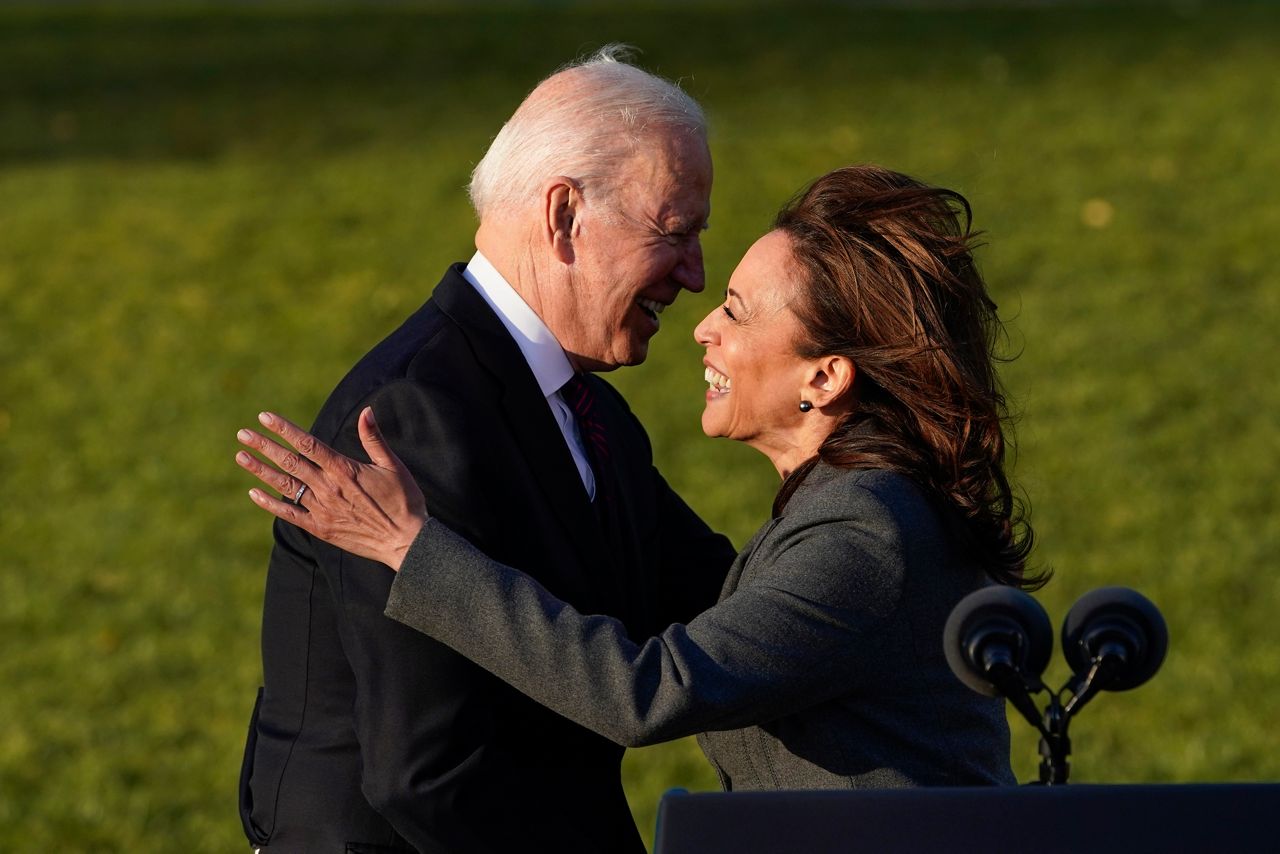
On Sunday evening, ahead of the announcement, Biden tapped former New Orleans mayor Mitch Landrieu as the point person responsible for coordinating the implementation of the massive investment.
The news about Landrieu’s new role, listed by the White House as Senior Advisor and Infrastructure Coordinator, was first reported by the Wall Street Journal.
Landrieu, who previously served as Lieutenant Governor of Louisiana during Hurricane Katrina, is widely credited as playing a major role in the city’s recovery from the devastating storm.
"As Mayor of New Orleans, Landrieu took office at a time when the city’s recovery from the devastation of Hurricane Katrina had stalled,” the White House wrote of Landrieu in a release. “He hit the ground running, fast-tracking over 100 projects and securing billions in federal funding for roads, schools, hospitals, parks and critical infrastructure, turning New Orleans into one of America’s great comeback stories.”
“I am thankful to the president and honored to be tasked with coordinating the largest infrastructure investment in generations,” Landrieu said in a statement released by the White House.
“Our work will require strong partnerships across the government and with state and local leaders, business and labor to create good-paying jobs and rebuild America for the middle class,” he added. “We will also ensure these major investments achieve the President's goals of combating climate change and advancing equity."
On Monday, the White House revealed the Infrastructure Implementation Task Force, which will be co-chaired by Landrieu and National Economic Council Director Brian Deese. Comprising the rest of the council will be:
- Department of Transportation, Secretary Pete Buttigieg
- Department of Interior, Secretary Deb Haaland
- Department of Energy, Secretary Jennifer Granholm
- Department of Commerce, Secretary Gina Raimondo
- Environmental Protection Agency, Administrator Michael Regan
- Department of Agriculture, Secretary Tom Vilsack
- Department of Labor, Secretary Martin Walsh
- Office of Personnel Management, Director Kiran Ahuja
"This Task Force will be committed to break down barriers and drive implementation of infrastructure investments across all levels of government to realize the President’s vision of rebuilding our nation’s infrastructure and positioning the U.S. to compete and win in the 21st century," the White House wrote in a statement.
Alongside the bill, Biden also signed an executive order "outlining the Administration’s implementation priorities and establishing an Infrastructure Implementation Task Force to coordinate the law’s effective implementation."
Per the White House, the six guiding principles of the bill, as outlined in the executive order, are:
- Invest public dollars efficiently, avoid waste, and focus on measurable outcomes for the American people;
- Buy American and increase the competitiveness of the U.S. economy, including through implementing the Act's Made-in-America requirements and bolstering domestic manufacturing and manufacturing supply chains;
- Create good-paying job opportunities for millions of Americans by focusing on high labor standards for these jobs, including prevailing wages and the free and fair chance to join a union;
- Invest public dollars equitably, including through the Justice40 Initiative, which is a Government-wide effort toward a goal that 40 percent of the overall benefits from Federal investments in climate and clean energy flow to disadvantaged communities;
- Build resilient infrastructure that can withstand the impacts of climate change and that helps combat the climate crisis; and
- Effectively coordinate with State, local, Tribal, and territorial governments in implementing these critical investments
The bill’s implementation comes at a time of sliding poll numbers for the Democratic president; Despite 63% of Americans showing support the infrastructure bill, according to a new ABC News-Washington Post poll, his approval numbers have fallen to 41%, making the implementation of this new spending crucial for Democrats hoping to hold on to both chambers of Congress in the 2022 midterm elections.
Biden’s policies are indeed popular among a majority of Americans. Fifty-eight percent of Americans, according to the same ABC News-Washington Post poll, also support his sweeping $1.85 trillion Build Back Better bill. The House is hoping to vote on that bill this week, and the White House expressed confidence that it will pass.
After the bill is signed, Biden will set off on a national tour to promote the bill to the American people, continuing an initiative he began last week at the Port of Baltimore in Maryland. The president will head to New Hampshire Tuesday to visit the state's Pemigewasset River, which has been on The Granite State's “red list” of bridges in poor condition since 2013. He will travel to Detroit on Wednesday to visit a General Motors plant.
Greg Fischer, the Mayor of Louisville, Kentucky, told Spectrum News that the bill is a "tremendous example" of bipartisanship.
"I’m really excited about broadband access," Fischer, a Democrat, told Spectrum News. "Everybody should have low cost, high speed broadband just like they have electricity in water."
Nan Whaley, mayor of Dayton, Ohio, and a candidate for Senate to represent the state, told Spectrum News that "as mayors," the bill is "not partisan at all."
"We had nearly 400 mayors from all 50 states, Democrats and Republicans, sign on to say 'Get this done,'" she added.
Although the White House had called passage of the infrastructure bill urgent, Biden waited to sign the legislation because many lawmakers were traveling this week, including Speaker Pelosi, members of congress and a number of cabinet officials who were in Glasgow for the U.N. Climate Change Conference.
One question looming over the proceedings about the ceremony Monday was whether or not the Republicans who supported the bill would show up. Nineteen Republicans in the Senate voted for the bill when it passed the chamber in August, along with 13 members of the House GOP.
The reality was that far fewer attended than supported the bill: While Republican Sens. Lisa Murkowski of Alaska and Susan Collins of Maine have said they plan on attending, the party’s leader in the chamber, Mitch McConnell, told a Kentucky radio station last week that “I've got other things I've got to do other than go to the signing ceremony.”
Other Republicans, including Louisiana Sen. Bill Cassidy, Maryland Gov. Larry Hogan, New York Rep. Tom Reed and Alaska Rep. Don Young were in attendance.
North Dakota Sen. Kevin Cramer, who supported the bill, but did not attend the ceremony, extolled the bill’s benefits for his state at a press conference last week.
“At the end of the day I work for the people of North Dakota, the employers and employees, and most importantly those that build out the infrastructure that moves commerce,” he said. “What I look for is opportunities where there are winners on all sides. And that’s what we have in this bill. The bipartisan Infrastructure Investment and Jobs Act is the right thing to do for North Dakota and our country.”
White House press secretary Jen Psaki said Friday that they invited a “broad group” of Republicans who played a key role in advancing the bill, adding: “The president looks forward to thanking them for their work, for working together to get this done for the American people.”
But Republicans have faced intense backlash for their support of the infrastructure measure, including from within their own party.
One prominent Republican, former President Trump, blasted McConnell’s support of the bill in a statement.
“Why is it that Old Crow Mitch McConnell voted for a terrible Democrat Socialist Infrastructure Plan, and induced others in his Party to do likewise, when he was incapable of getting a great Infrastructure Plan wanting to be put forward by me and the Republican Party?” the 45th president wrote.
Some GOP lawmakers have even received death threats for their support of the bill. Michigan Rep. Fred Upton shared with CNN last week a threatening voicemail in which a caller referred to him a “f****** piece of s*** traitor,” adding: “I hope you die. I hope everybody in your f****** family dies.”
And in New York, a Long Island man was arrested for making a death threat against New York GOP Rep. Andrew Garbarino, police said.
Murkowski, who recently announced she will seek re-election despite staunch opposition from Trump, called criticism of the bill from within her own party “petty.”
“This is about meeting our nation’s needs,” Murkowski said to the the Anchorage Daily News last week. “For those who, in my view, are going to be so petty that they would deny good, solid policy because they don’t want the person holding the keys to the White House today to be able to say they got that under their watch, what a shame on us that we’re not willing to put the priorities of the country first over the politics of this."
Spectrum News' Austin Landis contributed to this report.



